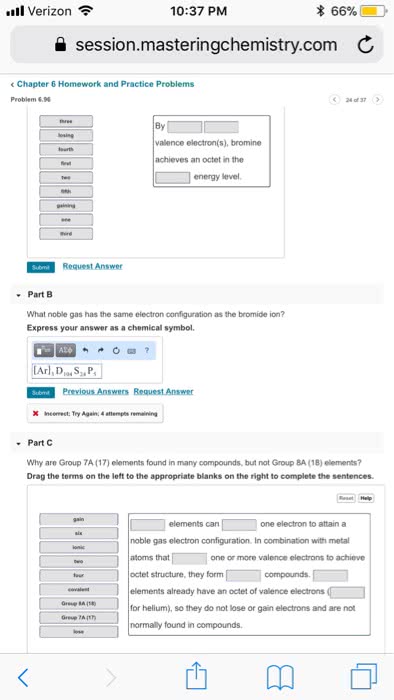CHEM 1210 Lecture Notes - Lecture 3: Group 8 Element, Valence Electron, Octet Rule
13 views4 pages
Document Summary
Under standard conditions, the noble gases (group 8 elements) are odorless, colorless, monatomic gases with very little (if any) chemical reactivity. In 1916, gilbert n. lewis pointed out that this a lack of chemical reactivity indicates a high degree of stability of their electron configuration (a full outer shell) Octet rule: the tendency of group 1a-7a elements to react in ways that achieve an electron configuration of eight valence electrons (like the noble gases) An atom that loses one or more electrons becomes a positively charged ion called a cation (ex: na+) An atom that gains one or more electrons becomes a negatively charged ion called an anion (ex: cl-) Ex: sodium: group 1 = 1 valence electron. In losing one electron, a sodium atom forms a sodium ion. It gains the same electron configuration as the noble gas neon. Ex: chlorine: group 7 = 7 valence electrons. In gaining one electron a chlorine atom forms a chloride ion.
Get access
Grade+20% off
$8 USD/m$10 USD/m
Billed $96 USD annually

Homework Help
Study Guides
Textbook Solutions
Class Notes
Textbook Notes
Booster Class
40 Verified Answers
Class+
$8 USD/m
Billed $96 USD annually

Homework Help
Study Guides
Textbook Solutions
Class Notes
Textbook Notes
Booster Class
30 Verified Answers
Related textbook solutions
Chemistry: Structure and Properties
2 Edition,
Tro
ISBN: 9780134293936
Basic Chemistry
5 Edition,
Timberlake
ISBN: 9780134138046
Principles of Chemistry Molecular Approach
4th Edition,
Tro
ISBN: 9780134112831
Principles of Chemistry Molecular Approach
3rd Edition, 2014
Tro
ISBN: 9780321971944
Chemistry: Structure and Properties
2nd Edition,
Tro
ISBN: 9780134293936
Chemistry: A Molecular Approach
3rd Edition,
Tro
ISBN: 9780321809247
Chemistry: A Molecular Approach
5th Edition,
Tro
ISBN: 9780134874371
Principles of Chemistry: A Molecular Approach
4th Edition,
Tro
ISBN: 9780134895741
Chemistry: The Central Science
14th Edition, 2017
Brown
ISBN: 9780134414232
